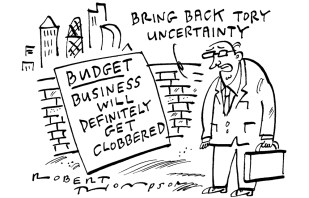A.N. Wilson has never been afraid of big subjects. His previous books have tackled the Victorians, Charles Dickens, Dante, Jesus and Hitler, to name just a few. So it’s hardly a surprise that he’s now decided to have a crack at Goethe’s Faust.
How do all the intellectual fireworks fit together? What, in short, does it all mean?
As literary whales go, they don’t get much bigger. In fact, apart from the Bible and the Divine Comedy, there aren’t many works which have had such a decisive impact on western literature. It has so deeply marked the popular imagination that most of us probably know the story, even if we haven’t read it.
It is, nevertheless, something of a puzzle. As Faust’s devilish pact unfolds, the drama touches on just about every major philosophical problem of Goethe’s day – all while bristling with wild, almost psychedelic, action. In the first few minutes alone we encounter God making a bet with Mephistopheles; the floating, disembodied head of the ‘World Spirit’; and a heated discussion about the limits of knowledge. And that’s to say nothing about the oodles of sex, death and bacchanalian revelry which follow. It really has got everything. But precisely for that reason it seems to elude interpretation. How do all these intellectual fireworks fit together? What, in short, does it all mean?
To his credit, Wilson doesn’t pretend to have the answer – or at least not a definitive one. Although he lavishes praise on ‘traditional’ textual approaches, he is sceptical of any attempt to impose unity on to such a complex, confusing pair of plays. And perhaps rightly so. He therefore sets out to explore the man behind the work instead. He wants to show not ‘how Goethe wrote Faust’ over a period of 60-odd years, but how Goethe’s life can help us understand what he was trying to do with Faust.
This has a lot going for it. Wilson is a talented writer, and he can certainly tell a good tale. He paints a vivid picture of Goethe marvelling over puppet theatres as a child; obsessing over beautiful inaccessible women as a young man; and befriending flawed geniuses such as Johann Heinrich Merck (supposedly the model for Mephistopheles) and Johann Gottfried Herder. In one particularly moving episode, he describes how Goethe watched the execution of a young woman who had been found guilty of killing her newborn baby, just like Faust’s lover Gretchen later does in the play. He doesn’t skirt round Goethe’s flaws, either. He is refreshingly frank about Goethe’s alcoholism, his pomposity and his socially awkward love for his ‘little whore’ Cristiane Vulpius.
But like Faust, Wilson ultimately comes unstuck. Apart from the odd observation here and there, he doesn’t really tell us anything new about Faust itself. Although he is conscious that the plays went through many different versions, he doesn’t make any effort to explore their evolution, or their relationship to Goethe’s life, in anything like a coherent way. Apart from the most obvious examples, Wilson’s parallels seem rather arbitrary. He simply shoehorns bits of the text into his narrative whenever he feels like it, whether they are relevant or not, and discusses them without regard for when they may have been written or how they fit into the plot more broadly. Rather than making Faust easier to understand, it only muddies the water further.
This wouldn’t matter all that much if Wilson’s meditations on Faust illuminated Goethe’s life more clearly. But sadly this isn’t the case either. The book is riddled with unforced errors. Goethe was not ‘ennobled by the Emperor’, as Wilson states on at least two occasions, but by Carl August of Saxe-Weimar. Ovid and Catullus would be surprised to learn that ‘falling in love… arose as a great theme in European literature with the Provençal troubadours’. August von Kotzebue’s 116 plays received 1,728 performances in Mannheim, not Weimar. And so on.

There are some bizarre claims, too. Time and again Wilson asserts that Goethe was one of the founders of the ‘modern’, but never bothers to explain what the ‘modern’ means, or how he arrives at his definition. Perhaps most troubling of all is his lengthy claim that Goethe’s tragedy had ‘more in common with Walt Disney than… with Thomas Mann’. Apart from the fact that some of Fantasia was based on Goethe’s 1797 poem ‘The Sorcerer’s Apprentice’, there is absolutely no sense in which this is true.
The further you wade through this book, the more both Goethe and Faust seem to recede into the shadows. They are consumed by the gloom – so much so that in the end it is difficult to make them out at all. Perhaps it is only fitting that Goethe’s last words were reportedly ‘More light!’ More light indeed.







Comments